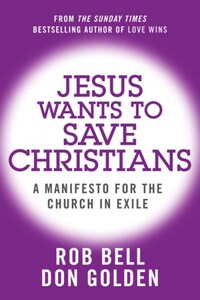Contents
Cover
Title Page
Preface
Introduction to the Introduction
Introduction: Air Puffers and Rubber Gloves
Chapter One: The Cry of the Oppressed
Chapter Two: Get Down Your Harps
Chapter Three: David’s Other Son
Chapter Four: Genital-Free Africans
Chapter Five: Swollen-Bellied Black Babies, Soccer Moms on Prozac, and the Mark of the Beast
Chapter Six: Blood on the Doorposts of the Universe
Epilogue: Broken and Poured
About the Authors
Endnotes
Discussion Guide
Credits
Copyright
About the Publisher
Preface
Part One
I remember the exact moment when I knew that Don and I had a book on our hands.
We were eating our usual once a week burrito discussing our usual topics—revolution, Jesus, our favorite British bands—you know, average sorts of things friends talk about, when Don asked me how King Solomon had built his temple.
How Solomon built his temple? What an odd question.
I had read that story about Solomon building a temple for God in the Old Testament Book of Kings, but I had no recollection of how he built it.
The answer? Don pointed out that Solomon built the temple using slave labor.
Hearing that for me was like a bomb going off.
Slaves? I’d never noticed that. The implications were stunning.
The earlier parts of the Bible, the ones about empires and power and liberation from slavery, suddenly took on new meaning. The prophets, and then Jesus, began to mean something different. And then the church, and the New Testament letters connecting Jesus and the Exodus began to make sense in ways I’d never considered.
And then Don kept going. He made connections between Solomon’s slaves and Egypt and Sinai and Jerusalem and Babylon and America and Iraq and politics and economics and churches and media . . . it was overwhelming. As we discussed more and more over the next weeks and months, rereading the stories of Jesus through this lens, I often felt like I was reading the Bible for the first time.
And the story that it was telling blew me away.
Reading the Bible through this new lens was so much more current and volatile and true and interesting and dangerous and subversive and hopeful and big than how I’d read it before.
Yes, I kept telling Don, there is a book here.
So that’s my hope for you with this book: I hope you have a series of those “bomb going off” kind of moments as you read this book. I hope you see in our reading and interpreting of this ancient book, the Bible, a new way of seeing our world. I hope you see that there is a common humanity we share with everybody alive today, and everybody who has come before us. I hope you see in the way the writers of the Bible critique their own use and abuse of power and blessing a way for us to think about our power and blessing.
And then, most of all, I hope you see Jesus’s invitation to be a force for good in the world, to wake up to our calling, to be saved in all of the ways that matter most.
—Rob Bell
November 2011
Part Two
On Christmas Eve 1968 the first humans orbited the moon. Highly trained Apollo 8 astronauts were ready for every eventuality—except one. The first photo of Earth from outer space unexpectedly shook the imagination of the world. This one shot of our fragile blue orb alone in the infinitude of space revealed our majesty and our vulnerability. By going to the moon we discovered ourselves.
We hope a similar change in perspective happens when you read this book.
Jesus Wants to Save Christians offers a different perspective on the Bible and on how we see ourselves at the beginning of the twenty-first century.
Since we mostly retell the Bible’s story through a new lens, the book’s message hasn’t changed since it was first released. But there are new challenges and new questions in a world that seems somehow scarier today than it did during the fires of President Bush’s wars.
For some, President Bush was an easy parallel to Solomon and Pharaoh. We argued that power exists for the cause of the poor and that America will be measured by the voices we fail to hear. Since the book was first published in 2008, some major punctuation points have been added: Arab Spring—what Bush tried with bombs, social media masses achieved with their thumbs. The Hummer dealership on 28th Street in Grand Rapids closed. In many ways, the world seems changed.
But the Bible still has a lot to say about empires. The Bible is always asking about the prospects of the poor. The vulnerability index is the measure that matters most in God’s economy. Read seriously, the Bible confronts the reader with the God of the oppressed.
We want you to discover the Bible as its own best commentary. We offer you a way to read the Bible that doesn’t require a library or a preacher or a politician or an academic to interpret for you. Once justice is seen as the thread woven into the fabric of biblical history, the whole Bible becomes much clearer. Justice is the issue when God redeems Israel from Pharaoh. Justice is at the heart of the Sinai law and justice is what Israel must show the world as a kingdom of priests. Justice is the measure the Jews failed to meet in their days of power and empire in Jerusalem. It was justice the prophets proclaimed as the way of return during the exile of the Jews in Babylon and it was justice that Jesus incarnated.









